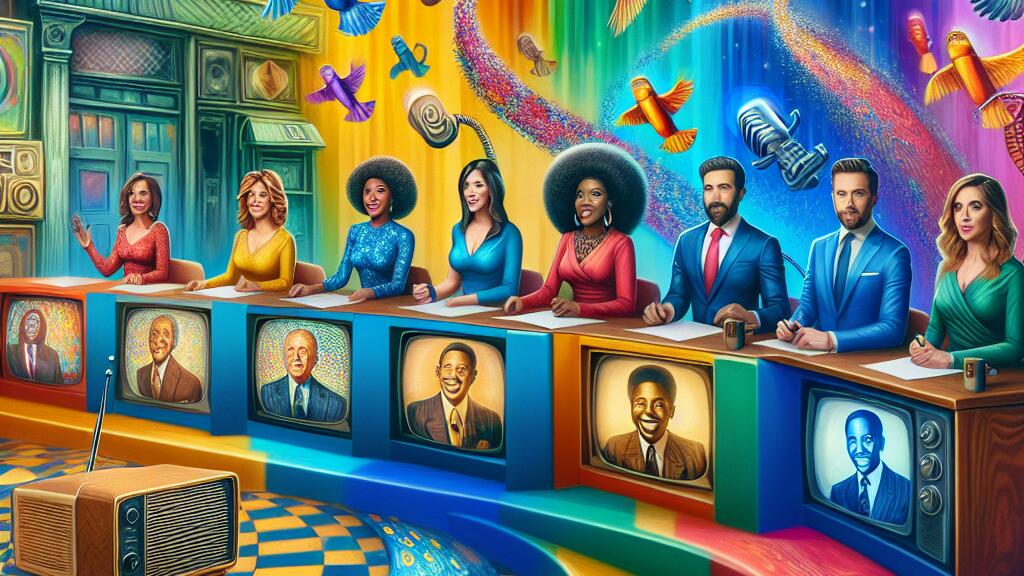The Evolution of Reality TV Hosting
Table Of Contents
The Evolution of Reality TV Hosting: How Hosts Have Shaped the Genre
Key Takeaways
- Development of reality television presenting and its beginnings
- Expansion of reality television in the early 2000s
- Changes in presentation techniques and styles
- Progress in technology and its impact on hosting
- Variety in hosts for reality television programs
The Evolution Of Reality TV Hosting | The Origins of Reality TV Shows
The Evolution of Reality TV Hosting traces its roots back to the inception of reality television shows, where the format first captivated audiences. Early television hosts played a crucial role in shaping the appeal of these shows, offering relatable personalities that drew viewers into the unscripted narratives. As reality TV began to flourish, these hosts became the faces of reality-television programming, guiding audiences through various formats, from dating competitions to survival challenges. The rise of reality-TV shows marked a significant shift in entertainment, highlighting the importance of engaging television hosts who could connect with the diverse array of participants and audiences. This evolution set the stage for the dynamic hosting styles and innovative approaches that continue to define the landscape of reality television today.
The Evolution of Reality TV Hosting | The Birth of Reality Television
The evolution of reality TV hosting can be traced back to the inception of reality television series in the late 1990s. This era marked a shift in programming styles, with shows blending elements of documentary-style reality television and entertainment. Early reality TV programmes introduced audiences to real people in unscripted situations, laying the groundwork for hosts who could engage viewers while guiding the narrative of reality television contestants. These hosts became crucial in constructing the on-screen personas of reality television personalities, seamlessly integrating their commentary with the unfolding drama.
As reality TV began to flourish, the demand for a charismatic figure to lead these shows became evident. An outstanding host for a reality or reality-competition program not only entertains but also anchors the emotional journey of reality TV stars. Television news and factual television started recognizing the cultural impact of reality-based television, paving the way for TV networks to prioritize vibrant and relatable hosts. This evolution contributed significantly to the popularity of reality TV-style shows, drawing in audiences eager to connect with their favorite reality television stars and their stories.
- The rise of charismatic hosts amplified the emotional stakes of reality shows.
- Early hosts often served dual roles as guides and entertainers, enhancing viewer engagement.
- Successful hosting styles varied from authoritative figures to approachable personalities.
- The shift in hosting standards led to the emergence of specialized training programs for reality TV hosts.
- Increasingly, hosts began to use social media to connect with fans and promote their shows.
- The integration of hosts in show narratives became essential for maintaining viewer interest.
- Today, diverse hosts reflect a wider range of perspectives, mirroring the changing landscape of reality television.
Early Hosts and Their Impact
The early days of reality television saw hosts emerge as key figures in captivating audiences. Shows like CBS reality productions reshaped the landscape of network television, blending elements from television game shows and classic daytime television. These hosts established a connection with viewers, bridging the gap between the scripted world of science fiction television series and the authenticity of reality shows. Their charisma and ability to engage participants brought a new dynamic to the television program format, setting the stage for future iterations of reality programs.
Hosts of the initial reality show wave played a critical role in defining the genre. Programs like “Survivor” and “Big Brother” showcased presenters who deftly navigated the complexities of human behavior in a televised setting. This authenticity resonated with audiences, culminating in a shift in television broadcasts and a growing interest in internet reality shows. The Evolution of Reality TV Hosting can be traced back to these pioneering figures who laid the groundwork for modern reality game shows, influencing both the format and the expectations of future hosts.
The Growth of Reality TV in the 2000s
The 2000s marked a pivotal period in the evolution of reality TV hosting, as several reality series gained unprecedented popularity. Viewers became enthralled by the sheer variety of formats, from competition shows to television anthology series that showcased real-life stories. Iconic hosts emerged, shaping the landscape of modern reality television and setting the stage for many reality television shows that followed. Criticisms of reality television began to surface, highlighting the ethical considerations surrounding the production of so-called reality television. As the genre expanded in the 2019–20 television seasons, it became evident that the expectations for hosts had transformed. Audiences sought charismatic presenters capable of engaging viewers in a more authentic manner, reflecting the evolution of reality TV hosting that commanded attention across platforms, including bbc television. Reality TV—which captivated millions—led to a rise in television comedy and tv-movie adaptations, blending genres in a way that kept the public’s interest alive.
Popularity Surge of Reality TV Shows
The reality television boom in the early 2000s marked a significant shift in the television genre, creating a landscape where long-running reality television shows became staples in American households. The Evolution of Reality TV Hosting played a crucial role in this phenomenon, as popular television programs began to feature hosts who were not just presenters but integral parts of the experience. With the advent of shows like “Survivor” and “American Idol,” previous reality television formats were remade to captivate a wider audience, leading to increased viewer engagement.
As audiences became more discerning, reality TV hosts emerged as influential figures who could shape the narrative and tone of their respective television shows. Reality TV hosts can serve a variety of important functions, from guiding contestants through challenges to fostering emotional connections with viewers. This adaptability contributed to the evolution of hosting styles, making them essential to the development of television today. The impact of these hosts highlighted how a well-crafted persona could drive the success of a program, further embedding reality television into the fabric of American culture.
| Show Title | Host | Premiere Year | Genre |
|---|---|---|---|
| Survivor | Jeff Probst | 2000 | Adventure/Competition |
| American Idol | Ryan Seacrest | 2002 | Music/Competition |
| The Bachelor | Jesse Palmer | 2002 | Dating/Reality |
| Keeping Up with the Kardashians | Ryan Seacrest | 2007 | Docuseries |
| The Voice | Carson Daly | 2011 | Music/Competition |
Iconic Hosts Who Defined the Era
Iconic hosts emerged during an era that transformed reality television into a staple of popular culture. With the rise of interactive reality shows, hosts became the faces of popular reality series, guiding contestants and engaging audiences through reality-television voting. Their charisma and connection with viewers turned these television series into compelling television, which often dominated daytime television shows. This new wave of hosting played a significant role in the evolution of reality TV programming, particularly as franchises expanded to include various sub-genres.
The television medium saw dynamic figures who captured the essence of the evolving format. From the charm of daytime television show hosts to the high energy of hosts on running reality shows, these personalities brought life to 24-hour-a-day reality television. Their influence shaped how audiences connected with reality sitcoms and other popular reality shows. This transformation underscored The Evolution of Reality TV Hosting, highlighting how iconic hosts defined the era and elevated the genre to new heights in television programming.
Transformations in Hosting Styles
The Evolution of Reality TV Hosting has significantly influenced the way audiences perceive television seasons and interact with shows. As reality content gained popularity, hosts transitioned from traditional roles into more dynamic figures who engage viewers directly. This change mirrored the rise of structured reality programming, which blurred the lines between scripted narratives and real-life situations. Interactive reality content became a staple of global reality channels, pushing hosts to adapt their styles to maintain relevance in a rapidly changing television landscape. As outlined in television genre books, the shift from fictional television programming to reality-based formats created a demand for charismatic hosts who could captivate audiences. Prime-time network television embraced this evolution, highlighting the pivotal role of hosts in enhancing viewer experience and interaction.
- The role of hosts has shifted from mere presenters to active participants in storytelling.
- Charisma and relatability have become essential traits for successful reality TV hosts.
- Audiences now expect hosts to build personal connections with them through social media platforms.
- Interactive formats encourage hosts to engage with audience feedback in real-time.
- The blending of genres has led to hosts taking on multiple roles, such as judges and mentors.
- Producers now prioritize host versatility to adapt to varying show formats and themes.
- The evolution of hosting styles reflects broader changes in audience consumption habits and preferences.
Changing Audience Expectations
The Evolution of Reality TV Hosting reflects significant shifts in audience expectations, particularly in contrast to scripted-TV peers. Viewers began to crave authenticity and connection, demanding more transparency from reality show participants. Traditional broadcasting models faced pressure from the innovative formats pioneered in Dutch television and American television series, leading to an emphasis on relatable hosts who could engage audiences in an intimate way. Hosting styles evolved to prioritize a more conversational tone, moving away from the polished delivery often seen in scripted shows.
Changing expectations also stemmed from the influence of sports television and televised competition, which underscored the need for dynamic interactions. Television producer Charlie designed shows that showcased real personalities and their unfiltered experiences, allowing moments of vulnerability and triumph. As audiences watched NBC shows and other platforms, the desire for spontaneity and raw emotion became paramount. The enclosed television studio settings of traditional formats began to feel restrictive, further fueling the demand for a more engaging reality genre.
The Rise of Charismatic Presenters
Charismatic presenters played a crucial role in The Evolution of Reality TV Hosting. Their energy and relatability captured the attention of broadcast audiences, particularly during the peak years of 2006-2010 when U.S. cable television was flooded with American reality shows. These hosts not only navigated the complexities of such shows but also engaged viewers in a way that transformed these programs into cultural phenomena. The influence of the Dutch reality show format also contributed to the rise of these vibrant personalities, establishing a template for further reality programs that sought to blend entertainment with genuine emotions.
The emergence of new shows demanded hosts who could adapt to evolving audience expectations. As the media space expanded, charismatic presenters became essential in connecting with viewers seeking diverse entertainment sources. Their presence elevated many shows beyond mere competition, as they offered compelling narratives and memorable moments. This shift marked a significant point in The Evolution of Reality TV Hosting, where the host’s ability to engage and charm became as important as the content of the shows themselves. As audiences craved authenticity, these dynamic leaders helped shape the next wave of reality programming.
Technological Advancements and Their Influence
The evolution of reality TV hosting has been significantly influenced by technological advancements that have reshaped viewer engagement and content delivery. Hybrid reality-competition shows emerged, blending traditional formats with innovative twists, reflecting the changing landscape of entertainment. With the rise of platforms enabling the first internet reality show, individuals found opportunities to create their own shows outside conventional networks. The television show “Glee” highlighted the shift towards inclusive narratives, while celebrity hosts became essential for drawing audiences to modern shows. These changes resonated with entertainment industry columnists, who noted how reality programming features and performative reality catered to evolving audience preferences. DIY entertainments flourished within this media trend, allowing fans to interact and participate, further transforming the dynamics of viewing experiences.

How Social Media Shaped Reality TV Hosting
Social media has played a pivotal role in The Evolution of Reality TV Hosting, creating an interactive platform for fans to engage with their favorite shows and hosts. This new media landscape has shifted the dynamics of entertainment, especially for staged living environments seen in many reality competition formats. Viewers can now discuss episodes in real-time, share opinions, and even influence the direction of certain shows, fostering a community around their favorite reality stars. Informational reality programs and three-episode television series have also adapted to leverage social media channels, enhancing viewer participation and connection.
The emergence of social media has also allowed for a diversification of hosts, including kids hosts who bring a fresh perspective to different shows. As audiences seek more relatable and engaging content, the way hosts interact with fans reflects the evolving expectations within the ever-changing media landscape. The relationship between hosts and viewers has become more personal, encouraging a more dynamic portrayal of personalities in entertainment. This evolution has set the stage for future reality productions to embrace innovative hosting styles and connect more meaningfully with audiences.
The Role of Live Interaction in Modern Shows
Live interaction has become a defining component of modern reality television. The Evolution of Reality TV Hosting has shifted from pre-recorded segments to real-time engagement with audiences, significantly enhancing viewer investment. Popular shows utilize platforms such as social media to allow fans to vote, comment, and influence outcomes, blurring the lines between scripted drama and purported reality competition. This engagement is particularly prevalent in competition-based reality formats, where viewers feel a part of the action during reality contests, ultimately shaping the trajectory of their favorite reality stars.
These changes reflect a broader transformation in the media landscape where traditional broadcasting methods are becoming less effective. Audiences now demand immediacy and authenticity, which has led to the rise of granada television documentary styles and innovative reality-competition programs. The ubiquitous entertainment industry has adapted, recognizing that live interaction not only captivates viewers but also drives the popularity of shows. As the realm of competition reality continues to evolve, the fusion of audience participation and programming is setting new standards for engagement in the reality genre.
Diversity in Reality TV Show Hosting
The landscape of reality TV hosting has changed significantly, reflecting The Evolution of Reality TV Hosting. Early reality titles often featured individuals who adhered to conventional scripted soap operas, limiting representation to a narrow segment of the population. As audiences craved more authenticity, unstructured reality began to dominate, with hosts who embodied the essence of the narratives, such as television commentator Charlie, who brought a fresh dynamic to the genre. The rise of documentary-style shows portrayed diverse topics, while reality rom-coms and reality-competition conventions expanded the types of narratives available to viewers. This evolution has led to greater representation across different genres, enhancing viewership and transforming the entertainment-industry institution into a more inclusive platform. Apprentice hosts have emerged to bridge gaps and engage wider demographics, reflecting changing societal norms and expectations.

Representation Across Different Genres
The landscape of reality TV hosting has transformed significantly, reflecting the diverse genres within the medium. From the compelling narratives of documentary series to the excitement of reality playoffs, each genre has called for an outstanding host who can engage and resonate with viewers. The Evolution of Reality TV Hosting has seen presenters navigate everything from scripted dramas to primetime soap operas, adapting their style to match the essence of the show. Live episodes have offered a unique opportunity for hosts to enhance viewer engagement, while original airings have allowed their charisma to shine through in ways that traditional television formats often do not achieve.
As audience preferences continue to evolve, the variety of hosting representation across different genres has become increasingly vital in American television. Interactive narratives have taken center stage, compelling hosts to foster a deeper connection with viewers, shaping the season-average television ratings for their shows. The impact of hosts on the success of reality TV programs is evident in how they influence show dynamics and cater to real events. The Evolution of Reality TV Hosting reflects a broader spectrum of voices, ensuring that each genre, from talk shows to competition formats, is represented authentically, enhancing the viewer experience during broadcast prime-time.
Conclusion
The Evolution of Reality TV Hosting has been marked by significant shifts in both style and substance. As shows began to book reality stars rather than traditional actors, audiences became accustomed to the authenticity these hosts brought to weekly episodes. This change fueled the reality appeal, enabling programs like the PBS series to attract diverse viewers. Iconic hosts emerged, shaping the way stories are told and altering the landscape of television. The genre’s growth reflects not only changes in audience preferences but also a broader cultural acceptance of unscripted entertainment, showcasing the dynamic interplay between television hosting and societal trends.
FAQS
How has the landscape of reality television programming changed with the introduction of new reality TV shows over the years?
The landscape of reality television programming has undergone significant transformation due to the introduction of various new reality TV shows that have captivated audiences. These shows have evolved from the first reality television programs into a diverse array of formats, including documentary-style reality television shows and reality-television franchises. This evolution has not only remade television culture but has also significantly impacted American television ratings. In particular, later reality television shows have explored narrative reality elements and incorporated cable-news pundit styles, illustrating the dynamic nature of reality television as compared to regular television.
What factors have influenced the development of the first reality show and how has it impacted American reality television culture?
The evolution of the first reality show laid the groundwork for the entire genre of reality-television shows we see today. Between 2006 and 2010, shows like the CBS show helped shape television development, showcasing aspects of real life through a documentary-style series. This remaking of television culture has led to a dozen reality shows and has significantly contributed to the representation of television arts in American media.
How have recent television shows redefined the concept of a reality show in the context of remaking television culture?
Recent television shows, particularly those produced between 2006-2010 by Fox reality, have significantly redefined the concept of a reality show. These changes include the blending of scripted elements with real show formats, resulting in a new genre that challenges traditional notions of television. This evolution is seen in various productions, including television show Glee, which incorporates aspects of fictitious reality competition while influencing the broader landscape of American reality television, as highlighted by programs featured on platforms like Newshour and aspect productions.
What are some notable reality-show trends observed in TV movies produced in the 2006-2010 Fox Reality period that contributed to remaking television culture?
During the 2006-2010 Fox Reality period, several notable trends in reality-show TV movies emerged that significantly contributed to remaking television culture. These included the rise of competitive formats, increased viewer interactivity, and a blending of scripted elements with unscripted reality content, which redefined audience expectations and engagement with reality programming.
How do reality TV show hosts adapt their styles to engage audiences in a tv-studio setting?
Reality TV show hosts often adjust their presenting styles to better connect with audiences in a tv-studio environment, utilizing elements like humor, spontaneity, and audience interaction to create a more engaging viewing experience. This adaptability is crucial in maintaining audience interest and enhancing the overall impact of the show.







